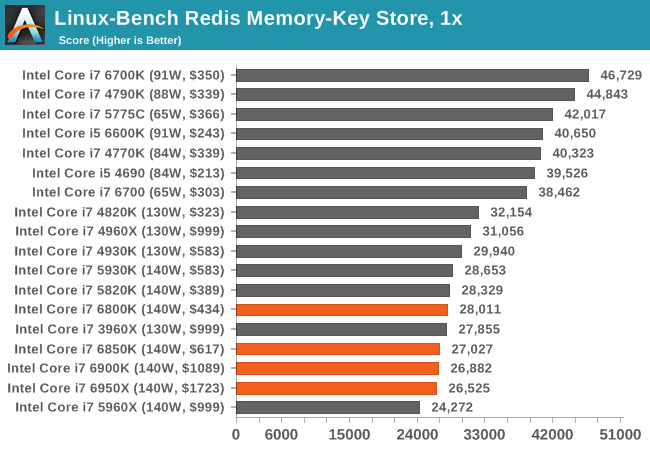The Intel Broadwell-E Review: Core i7-6950X, i7-6900K, i7-6850K and i7-6800K Tested
by Ian Cutress on May 31, 2016 2:01 AM EST- Posted in
- CPUs
- Intel
- Enterprise
- Prosumer
- X99
- 14nm
- Broadwell-E
- HEDT
Linux Performance
Built around several freely available benchmarks for Linux, Linux-Bench is a project spearheaded by Patrick at ServeTheHome to streamline about a dozen of these tests in a single neat package run via a set of three commands using an Ubuntu 11.04 LiveCD. These tests include fluid dynamics used by NASA, ray-tracing, OpenSSL, molecular modeling, and a scalable data structure server for web deployments. We run Linux-Bench and have chosen to report a select few of the tests that rely on CPU and DRAM speed.
C-Ray: link
C-Ray is a simple ray-tracing program that focuses almost exclusively on processor performance rather than DRAM access. The test in Linux-Bench renders a heavy complex scene offering a large scalable scenario.

NAMD, Scalable Molecular Dynamics: link
Developed by the Theoretical and Computational Biophysics Group at the University of Illinois at Urbana-Champaign, NAMD is a set of parallel molecular dynamics codes for extreme parallelization up to and beyond 200,000 cores. The reference paper detailing NAMD has over 4000 citations, and our testing runs a small simulation where the calculation steps per unit time is the output vector.

Redis: link
Many of the online applications rely on key-value caches and data structure servers to operate. Redis is an open-source, scalable web technology with a strong developer base, but also relies heavily on memory bandwidth as well as CPU performance.
[words]












205 Comments
View All Comments
unityole - Tuesday, May 31, 2016 - link
well time to readDrumsticks - Tuesday, May 31, 2016 - link
I've gotten through about half of it so far (and the conclusion) but man, those prices... Zen is supposed to be really, really close to Broadwell in IPC. Imagine that 8-core Zen part with 90-95% of BDW-E performance at 30% of the price. That would be really pretty nice.Great review so far, and I'm sure the rest is awesome!
SunLord - Tuesday, May 31, 2016 - link
If Zen is 90% the performance of BDW-E then it will be priced to match that though I doubt they'll break $999. AMD will try and under cut Intel but it's not gonna give a away a great performing chip like it had to with the crappy cores it has nowjjj - Tuesday, May 31, 2016 - link
lol 7$ per mm2 for top SKU is beyond outrageous. Anyone buying this deserves a nomination for the Darwin Awards.Zen can compete with Intel's 2 and 4 cores + pointless GPU on price, easily.
Railgun - Tuesday, May 31, 2016 - link
Because dying in a stupid way is akin to buying an expensive chip. And since when would price per area be any useful metric?Shadow7037932 - Tuesday, May 31, 2016 - link
>Zen can compete with Intel's 2 and 4 cores + pointless GPU on price, easily.That's what you're hoping for. For all we know, there could be some serious issues with Zen. Remember the TLB issue with the original Phenoms?
silverblue - Tuesday, May 31, 2016 - link
...and the AVX memory write performance issues with Piledriver. Still, what architecture doesn't have bugs?Ratman6161 - Tuesday, May 31, 2016 - link
I've been wanting to like AMD for a long time. I still remember the good old days of the Athlon 64 and 64 x2 when they used to beat Intel and at a lower price. but they keep on disappointing me. I'm taking an "I'll believe it when I see it approach"Azethoth - Tuesday, May 31, 2016 - link
I think you mean we remember that one time the Athlon 64 beat intel and we bought it but everyone else stuck with Intel because Intel, or AMD is for gamers, or Intel being monopolistic.That is more than 10 years ago though and it seems that by stated policy those days are never coming back for AMD.
usernametaken76 - Tuesday, May 31, 2016 - link
Eh, I remember prior to Athlon 64, just plain old Athlon XP, the value was tremendous compared to Intel. There was no sense in buying Intel if you were building a gaming rig, something for yourself to do basic computing tasks, etc. Intel was for suckers who bought business class desktops.